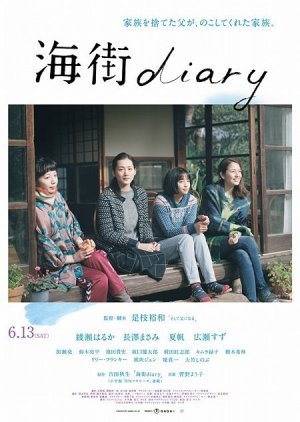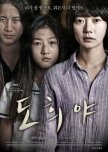
"Let's live together, the four of us."
If there is both hope and sadness to be found in the human condition, it is to be found in films like ‘Our Little Sister’. Nurtured by Koreeda’s empathetic and sensitive direction, it flourishes into showers of pink cherry blossoms and joyous smiles, evoking such rapturous beauty that you want to stay in the moment for just a little longer. But time moves on- the seasons change, the cherry blossoms fall to the ground and people say their farewells to each other. Through its harmonious balancing of dual aspects: optimism and melancholy, caring and abandonment, life and death, this bittersweet drama embodies the concept of ‘Mono no Aware’ (物の哀れ). There is vibrance and beauty in the existence of life, but it is also fragile, transient- under the watchful gaze of an old mansion and a giant tree, it blooms and fades away in the tiniest span of time. But ‘Our Little Sister’ emphasises- quietly but emphatically- that this is all the more reason to savor it in every moment, be it eating meals with your loved ones, feeling the sun streaming down on your face as you ride through a tunnel of falling petals or looking out at the grey waves after a funeral has passed.Moving away from this concept of ‘Mono no Aware’, Koreeda centres his drama on a fractured family unit and depicts how it heals-slowly- as the missing piece is filled by another. As he always does, he “turns the camera into a window” (to quote Brian Tallerico), capturing both the ups and downs, and the larger joys and tragedies with a masterful lucidity. I’ve already waxed lyrically on Koreeda’s other films so there isn’t much left for me to say as it ticks all of his boxes- damaged families, slow pacing, food scenes, passing trains, etcetera. One interesting thing that I would like to point out is how the composition of the (matriarchal) household has changed in the absence of the father and mother. Sure there are three sisters, but Sachi is ostensibly the mother-stern yet kind- while Yoshino and Chika are like unruly children. When Suzu enters the household, the two middle sisters move up the totem pole, resulting in the youngest sister being doted on as both a child and a little sister. And only when their real mother enters the picture are we reminded that Sachi is, herself, a daughter- even if her childhood was unwrought by the folly of adults. In depicting the shifting of familial roles, as he did in ‘Nobody Knows’, Koreeda provides a testament to the strength and adaptability of children (through three of them have grown up). Trauma may have shattered their lives, but through their shared companionship, they slipped back into the flow of life. Time spent together hardened and solidified the bonds between them, and having confronted and moved on from the past, their scars began to fade away.
The main deviating factor of ‘Our Little Sister’ from Koreeda's filmography is its soundtrack. Foregoing Gontiti's melancholy guitars or Bach's variations, Koreeda instead chooses a lush and sweeping orchestral score by the talented Kanno Yoko- a perfect complement to the scenic coastside setting of Kamakura. It seems not everyone liked this soundtrack, with some reviewers complaining that it is excessively sentimental, syrupy, sickly-sweet, something else with sibilance. However, I think that there is nothing wrong with it due to how this film is (intentionally) more of an audiovisual feast than Koreeda’s others. Similarly, the soundtrack could be accused of broadcasting the intended emotions too ‘obviously’, betraying Koreeda’s tendency towards the implicit and objective. But since the film doesn’t veer into being excessively sentimental or melodramatic, I don’t see a problem with this. In short, the soundtrack is excellent, and it is streaming on spotify and apple music for your listening pleasure.
A large part of this film’s popularity is presumably due to its ensemble cast, all of whom performed excellently. Ayase Haruka and Nagasawa Masami, both mainstream stars, conjured forth their inner talent to give naturalistic, high-caliber acting. Kaho, in a far cry from her darker roles, was great as the goofy Chika- though I still found it hard to erase the memory of her as the blood-soaked vampire warrior K from 'Tokyo Vampire Hotel'. Suzu, then a newcomer, clearly had some measure of uncertainty- but this was perfect for her character, whose wide eyes radiated sincerity and later, well-earned happiness. Other names with considerable mainstream fame- regulars Kirin Kiki, Lily Franky, Kase Ryo, then Suzuki Ryohei, Sakaguchi Kentaro (in a subtle ‘Ore Monogatari’ reunion), Tsutsumi Shin'ichi, Fubuki Jun, Otake Shinobu (the mothers from ‘Soredemo Ikite Yuku’) and so on- also contributed to the vast stirring pot of talent. Another special mention to Oshiro Maeda, then a young lad, who I hope to see in more of Koreeda’s future works.
Compared to his other work, ‘Our Little Sister’ isn’t regarded as strongly by critics. It was apparently disparaged at Cannes and critics have looked down their noses at it, labelling it as “decidedly middle-brow”, “Kore-eda lite”, “frictionless” and worst of all, “boring”. To which I say that they’re just snobbish, pretentious and a bit too jaded. This film isn’t meant to be dark, conflicted, fraught with emotion. It is meant to be a feast for the senses and for the heart- and to that end it succeeds, leaving viewers emotionally satisfied and with just a tinge of wistful sadness. 8.5/10
Cet avis était-il utile?

It's subtle but as with Koreeda, it's nothing new: it's about the little details and the little things. I say that Our Little Sister doesn't come as strong because it's less sentimental and it's less melodramatic. The conflict here is not as jarring as say, Nobody Knows or Like Father Like Son. That's one aspect that makes it seem directionless but if you look at it from another way, maybe that's the intention: not to have such a big conflict (the fact that the sister is another woman's is the central conflict) but to just tell a story. And one that's still touching. As someone who doesn't have a sister (I have two brothers and the middle child), I felt the bonds of sisterhood even just a little.
Koreeda trademarks are still present: music pacing (this time, not much piano), long shots showing the beauty of the setting hence, not much close-up and the little details (e.g. the umerashi). Though this time, we don't have young actors (save for Hirose Suzu who is around 17 years old when she filmed this), but the cast including Haruna Ayase, Kaho, Masami Nagasawa (who was also in I Wish) still delivers incredible performances. All three of them were nominated in Japan Academy Award for their performances.
I actually liked the contrast between the four sisters, Ayase plays the eldest, the mother figure, Nagasawa plays the carefree, stylish one, Kaho plays the oddball, happy-go-lucky and Suzu plays the quiet, simple one. It's such a treat to watch all these different personalities go together and interact. There is undeniable chemistry between the four.
Suzu (who won Breakthrough Star in Japan Academy Award), a current rising young star, whose two TV dramas I've seen, can act but sincerity lacks (like her eyes, it's shallow, it doesn't speak the emotions, you get what I mean? Some call her a deadeye actor but she can cry alright) although here because it's less melodramatic, her character fits her well, comparatively speaking. (But with more roles being given to her currently and working with talented actors, perhaps it's bound to change.)
As with Koreeda, lines are so natural and everything flows so well. The cinematography is so beautiful and the beauty of the countryside has been highlighted in the film. It also competed for Palme d'Or at Cannes 2015 (Suzu at Cannes at 17!!)
Our Little Sister isn't bad, I enjoyed it for its simplicity and beautiful visuals. But perhaps its unsentimental approach makes it a lackluster watch compared to other heavy Koreeda's dramas. Indeed, it doesn't have the feels but it has a calming effect as you watch: the setting helps, and the natural acting helps. It won't break your heart but it will touch your heart.
Cet avis était-il utile?

Cet avis était-il utile?

that unspoken bond between the sisters that warms the heart
It's like a 3D Ghibli film lol. Truly Koreeda's gem. No unnecessary dramas, just pure human emotions, relationships, highlighting the sisterhood of four girls. It offers insights into Japanese life and customs, and the cinematography is very pleasing to the eyes. All the casts are great. Not only they were beautiful and great in acting but they made it look like they weren't even acting at all. Hirose Suzu's acting here also got praised by THE Bong Joon Ho. No wonder it won the Japan Academy Prize for Picture of the Year in 2016 and was selected to compete for the 2015 Cannes Film Festival. I keep on watching at least once a month and will never get tired of it. Truly a masterpiece. Must watch.Cet avis était-il utile?

Suzu: I want to stay here forever.
I've been wanting to see this 3 years ago and finally, I watched this a few days ago and it was beautiful.
Our Little Sister about these three sisters in their adult age visits their father's funeral and there, they meet their younger sister who they share the same father. A story about family and sisterhood in the most genuine way.
I just happen to know that this film was based on a manga with the same title. Kore-eda surely knows how to capture a story about a family in a way it has more into its story than just merely shows it off with a blend of good capture of setting and cinematography that warms the tone of the whole film. Kore-eda films have that strong familial bond but on his films but at the same time it dives you into their character's conflicts & core but for Our Little Sister, Kore-eda takes us into the genuine side of sisterhood without any punches of regrets.
This kind of story often overreact by some mainstream television dramas here in my country and its so sad because it has always the same formula where the first family meets the second family then they fight for their rights or their inheritance of the late parent but Our Little Sister by Kore-eda shows the kindness, softness, and genuineness of a family and sisterhood embracing another without any prejudice, embracing them like a long time family member. The film doesn't have a big conflict to make a huge fight for but the main thing that I like is that the simplicity and accuracy of how a fiction story can also relate into someone's real life story
The 3 main actresses in this film are my favorites and I'm so glad that they cast in this beautiful film portraying a loveable and kind sisterhood.
Cet avis était-il utile?

Rifky Nobu Mitsuki
1 personnes ont trouvé cette critique utile
A heartwarming family drama between 4 sisters who live under the same roof, where the youngest is a half sibling due to different mothers. The situation is quite relatable for me because I also have a half sibling too, and this step family situation is very complicated, there are many boundaries that cannot be crossed, sometimes it feels awkward, and maybe sometime in the future when my parents are no longer around, I will did the same as Sachi did, as an oldest child from both family.
The conflicts that are presented also seem to be commonplace in families, such as children and mothers who don't get along but still love each other, and some minor conflicts that make the story of these 4 sisters colorful.
This film is full of positive vibes, the chemistry between the main cast is very convincing that they are sisters who love each other, they will be there for each other and show that the house where they live is not worth selling.
Hirokazu Kore-eda, I like his direction, probably gonna check his other works.
Cet avis était-il utile?

Cet avis était-il utile?

La hermandad como una construcción
Como muchas otras de Koreeda, la película no se centra en una historia lineal si no en las emociones de un grupo de personajes bien hechos. Las tres hermanas funcionan como una familia natural, dónde cada una tiene su personalidad y ninguna es perfecta (ni siquiera Sachi) y a ellas, se suma sin dudarlo la dulce Suzu que prefiere estar con sus hermanas desconocidas antes que con su madrastra. Todo esto, para abordar el lazo familiar y la hermandad de un forma bella y poética, sin olvidar sus problemas. Recomiendo.Cet avis était-il utile?

If some one want to watch melodrama, action, fantasy or supernatural, then this movie is not for them. It is plain, quite straight and simple movie, hope you like to watch.
Cet avis était-il utile?









































